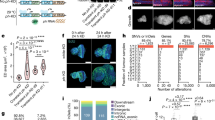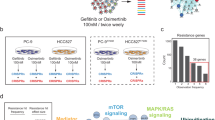Abstract
Deletions of chromosomal region 9p21 are among the most common genetic alterations observed during the clonal evolution of high grade malignant gliomas. Structural and functional evidence has suggested that homozygous deletion involving CDKN2A (the genetic locus encoding the cyclin-dependent kinase inhibitor p16INK4a) is a mechanism of inactivation of this gene and that it can be a growth suppressor in human gliomas. However, the presence of other potential suppressor genes in the 9p21 region and the relatively large sizes of the deletions has made it difficult to be certain that the CDKN2A gene is their actual target. Here, we tested this hypothesis by determining the growth suppressive effects, cell cycle inhibitions, and the activities of seven naturally occurring glioma-derived CDKN2A alleles carrying point mutations and found that two of them were functionally compromised. To resolve discrepancies among the different existing functional assays, we developed an assay for p16INK4a function that allowed us to demonstrate that the expression of wild-type CDKN2A, but not alleles with inactivating mutations, prevents pRB phosphorylation in vivo in human glioma cells. These data suggest that CDKN2A is a critical target for mutational inactivation in human malignant gliomas.
This is a preview of subscription content, access via your institution
Access options
Subscribe to this journal
Receive 50 print issues and online access
$259.00 per year
only $5.18 per issue
Buy this article
- Purchase on Springer Link
- Instant access to full article PDF
Prices may be subject to local taxes which are calculated during checkout
Similar content being viewed by others
Author information
Authors and Affiliations
Rights and permissions
About this article
Cite this article
Arap, W., Knudsen, E., Wang, J. et al. Point mutations can inactivate in vitro and in vivo activities of p16INK4a/CDKN2A in human glioma. Oncogene 14, 603–609 (1997). https://doi.org/10.1038/sj.onc.1200870
Received:
Revised:
Accepted:
Issue Date:
DOI: https://doi.org/10.1038/sj.onc.1200870
Keywords
This article is cited by
-
ctDNA detected by ddPCR reveals changes in tumour load in metastatic malignant melanoma treated with bevacizumab
Scientific Reports (2019)
-
Loss of p16Ink4a confers susceptibility to metastatic melanoma in mice
Nature (2001)
-
Pharmacogenomic research and serum DNA analysis in the treatment of non-small cell lung cancer
Revista de Oncología (2001)
-
Translation of p15.5INK4B, an N-terminally extended and fully active form of p15INK4B, is initiated from an upstream GUG codon
Oncogene (2000)
-
Functional evaluation of tumour-specific variants of p16INK4a/CDKN2A: correlation with protein structure information
Oncogene (1999)



